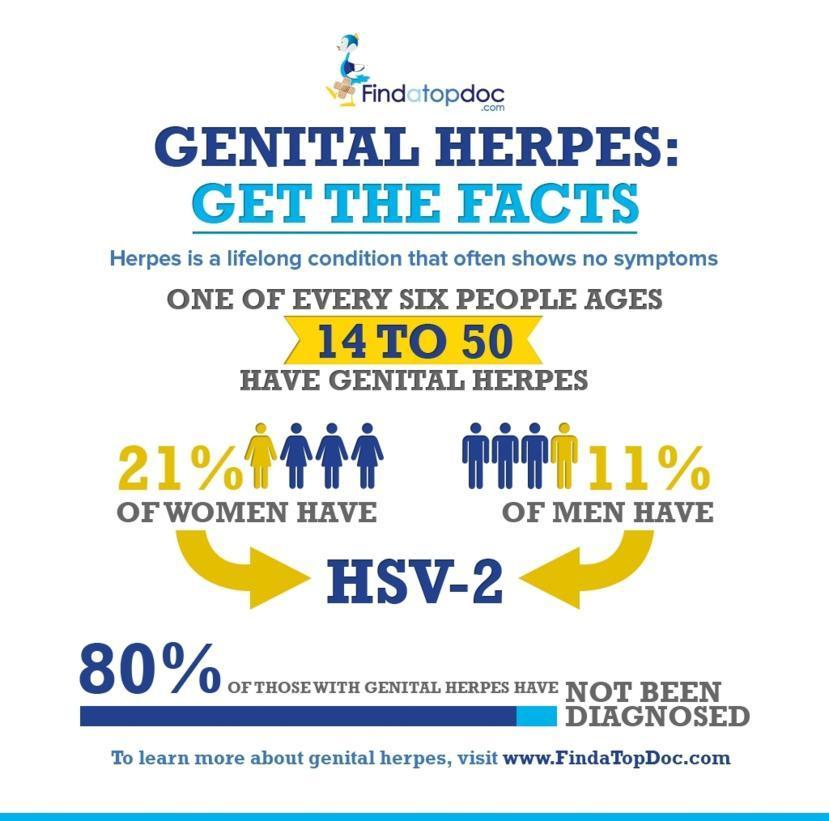Signs and Symptoms of Genital Herpes

Genital herpes is a common sexually transmitted disease (STD). It is a disease that causes sores or blisters, especially on the genital areas. This STD is the result of type 2 herpes simplex virus, or HSV2. Sometimes genital herpes is the result of the strand of the herpes simplex virus that causes cold sores, herpes simplex virus type 1 or HSV1. Very often, most of the people who have the virus do not know that they are infected because they do not exhibit any signs or symptoms or they appear to be very mild.
Genital herpes symptoms
The following are typical signs of the genital herpes virus:
- Pain or itching usually begins within two to 10 days after sexual contact with someone who has the virus.
- Little bumps and/or blisters typically show up a few days after contracting the virus. They are usually red or white in color.
- Ulcers can develop from the rupturing or oozing of blisters.
- As these wounds heal, scabs often develop.
Most people with herpes are asymptomatic which means they do not experience any symptoms. Symptoms may appear after several months or even years upon being infected with the herpes virus (HSV). Though many people are asymptomatic for a longer period of time after infection, they typically experience some symptoms during the primary infection period. This occurs between the first few days after being infected with the herpes virus. The first episode of symptoms is typically the most severe as patients notice less of it with each recurrent infection. Symptoms during a primary infection usually resolve by themselves within 20 days, even without treatment. This means the sores will heal and leave no scars. You might feel pain while urinating due to the ulcers. It is also common to feel general tenderness or pain in the genital region during a herpes breakout. Flu-like symptoms including fever, headache, swollen glands in the genitals and muscle aches can be experienced recently after contracting the infection.
Symptoms during a primary infection include:
- Small blisters or sores on the genitals, rectum and occasionally on thighs and buttocks which may cause pain when sitting
- Painful urination
- Smelly discharge from the vagina
- Malaise
- Flu-like symptoms such as fever and swollen lymph nodes
- Headaches
- Backaches
- Blisters and ulcers in the cervix of women
Sores appear at the site of infection. They can spread if you touch them and then rub or scratch other body parts such as the eyes or mouth.
Men and women can develop sores on the:
- Buttocks
- Anus
- Mouth
- Penis or vagina
- Scrotum
- Cervix
- Urethra, the channel inside the penis or vagina leading to the bladder
- Thighs
Since the herpes virus will remain in the body of an infected person for the rest of his or her life, recurrent infections may occur occasionally. Recurrent infections arise when the virus travels from a patient's nerves to their skin. After the primary one, infections are usually shorter and less severe. The number of outbreaks varies from person to person but is usually around an average of four to five per year. The risk factors of recurrent infection include other illnesses, poor diet, emotional or physical stress, surgical trauma, exposure to ultraviolet radiation and the use of steroids.
Symptoms of recurrent infections include:
- Burning or itching sensation in the genital area
- Painful red blisters around the genitals, rectum, buttocks and thighs which may burst and leave sores
- Blisters and ulcers on the cervix of women
- Burning, tingling and itching sensations at the location of where the disease was first contracted
- Pain experienced in the lower back, buttocks and legs
The frequency and severity of recurrent infections reduces with time. Patients can reduce their risk of recurrent infection by decreasing stress, practicing proper nutrition and avoiding triggers such as steroids and ultraviolet radiation. Treatment with antiviral medications such as acyclovir can also reduce the frequency of outbreaks. These medications help lower the risk of spreading genital herpes to a patient's sexual partner(s).
Genital herpes occurs in women more than in men. It is spread more easily from men to women than vice versa.
Complications
Having multiple sexual partners raises the chances of contracting herpes simplex virus type 2, therefore raising your chance of being infected with genital herpes.
Other STDs can easily be transmitted and contracted through open genital sores.
Mothers who are infected with herpes can pass the virus on to their babies during childbirth. This puts the newborn at risk of blindness, brain damage and even death.
It is possible for herpes to cause swelling in the urethra. If inflammation is severe, a catheter may be needed to drain the bladder. The urinary track may get blocked. In very rare cases, the herpes simplex virus can cause swelling and increased cerebrospinal fluid around the brain and spinal cord. As a result, the patient will be affected by meningitis of the brain.
Treatment: No cure has been discovered for genital herpes. It will stay with the patient for life, along with recurrences. But fortunately, medications can be used to treat and reduce symptoms. The disease spreads through direct contact with someone who has the virus. Such contact includes sexual intercourse and oral sex, along with any skin contact with an infected sore.
First outbreak of genital herpes
The initial episode is often the most painful one and will typically last for a longer period than future breakouts. Symptoms may last for two to four weeks. During the first outbreak, an individual should see a doctor as soon as possible if he or she is experiencing the symptoms of genital herpes. The sooner treatment begins, the more effective it will be.
Individuals who have been diagnosed with genital herpes should:
- Avoid excessive heat or sunlight which can increase irritation.
- Use non-scented soaps, deodorants, products, etc.
- Wear comfortable loose-fitting cotton clothing.
- Take mild pain relieving medications which are available over the counter.
- Use only cotton clothes as it soothes the irritation.














